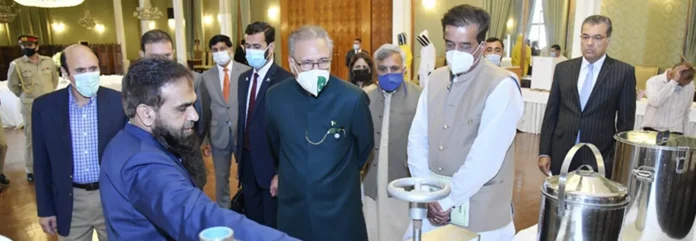“With Chinese technology, we have witnessed a historic breakthrough in local royal jelly production.” “Thirty beekeepers have mastered the skill to extract royal jelly, and more will be trained in the future,” Dr. Muhammad Asif Aziz told the reporter.
He is an Associate Professor of the Department of Entomology at Pir Mehr Ali Shah Arid Agriculture University Rawalpindi, the person in charge of the Billion Tree Honey Initiative (trial phase), and a participant in the online training course on beekeeping and honey processing technology sponsored by the Ministry of Commerce of the People’s Republic of China and organized by Hunan Agricultural Group Co., Ltd. in the summer of 2021.
For him, the training came just in time as he was eager to learn more about royal jelly production, bee breeding techniques, honey production technology, and bee-related product processing to reach the goal of the Billion Tree Honey Initiative, which is to produce 70,000 metric tonnes of honey through the introduction of modern beekeeping equipment, training in the latest technologies, standardisation and product certification, and marketing.
“It is challenging to receive technical training online, but I’m lucky to have a great online management team to keep everything organized.” Chinese professors demonstrated the country’s beekeeping technology through theoretical explanations and demonstrations on apiaries. And there were interesting introductions to Chinese culture.
He termed the training “beyond expectations” and was named an excellent trainee at the end of the training program. The training made him realise that to further develop the apiculture industry in Pakistan, the first step should be to improve the skills of local practitioners in the production of various bee products, including royal jelly and other higher-value bee products, through training and capacity-building programs.
Therefore, he started to train local beekeepers in two categories. One is a short-term course that teaches modern agriculture technology for professional bee farmers. The other is middle- to long-term training for green hands.
Royal Jelly Technology
Previously, local beekeepers used to think that royal jelly could only be produced in natural beeswax cups and in queen less colonies.
As a result, they were mostly hesitant to produce this valuable product due to the fear of a loose bee population in the absence of queens. They considered royal jelly production to be more expensive than net profits.
After learning about China’s royal jelly technology, Dr. Muhammad Asif Aziz and his students, Ali Raza and Usama Umer, decided to use the Chinese technology. Then he invited several bee farmers to learn and practise together. To everyone’s surprise, royal jelly was successfully produced with plastic queen cells in colonies with queens.


